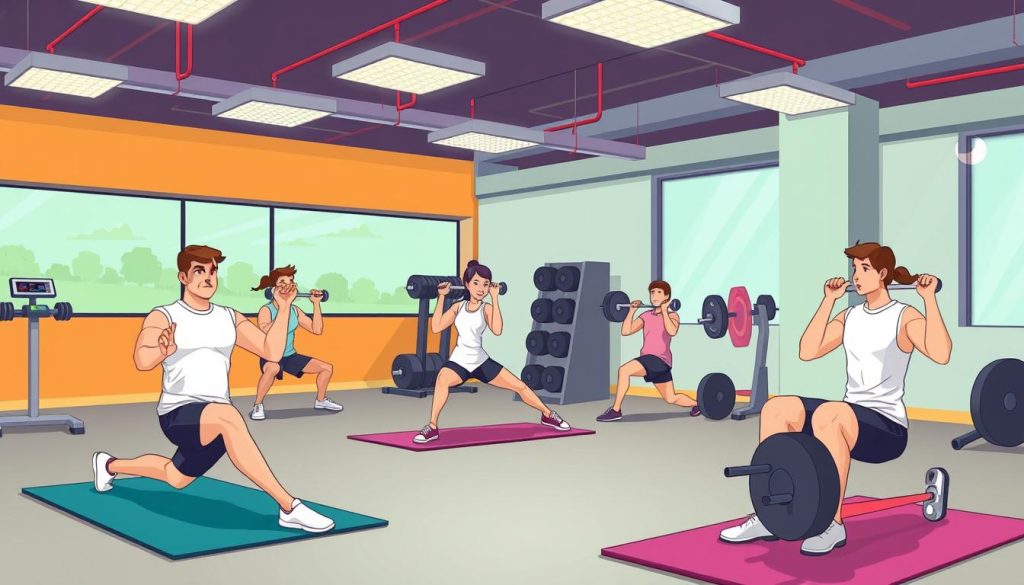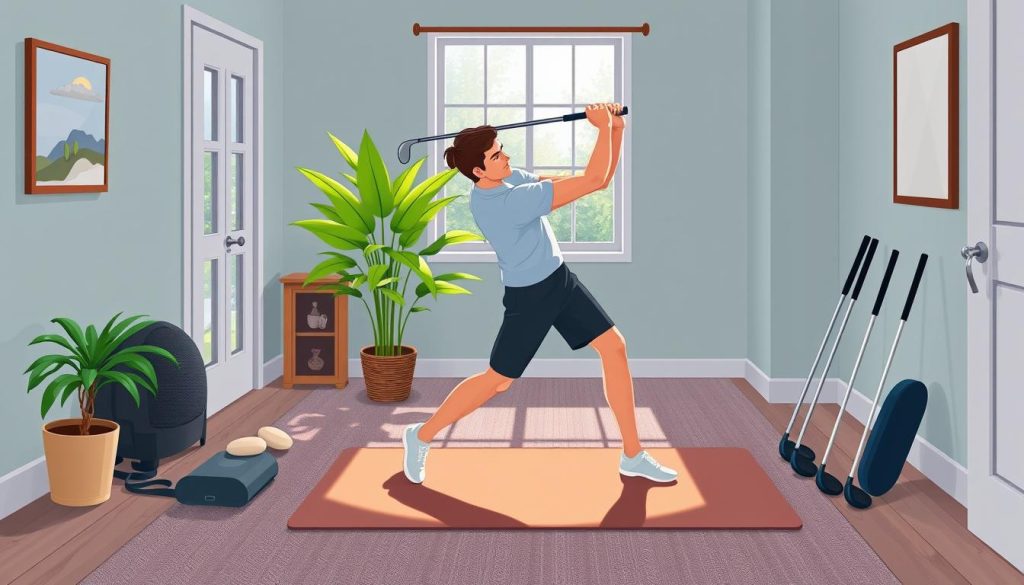Golf swing drills are key to bettering your game. This guide covers golf fitness programs and swing fundamentals. You’ll learn to boost strength, flexibility, and power for a better swing.
Golf demands quick, powerful movements. The sport’s one-sided nature can cause muscle imbalances and injuries. Certain exercises can help with shoulder, upper back, and hip mobility. This reduces injury risk and boosts your range of motion.
Tight hip flexors can lead to lower back injuries in golf. To prevent this, focus on hip flexibility and core exercises. Compound exercises are vital for golf fitness. They help your body work together during your swing.
Key Takeaways
- Golf fitness programs improve swing mechanics and reduce injury risk
- Mobility exercises for shoulders, hips, and upper back are crucial
- Core strength contributes to shot distance and stability
- Lower body exercises enhance leg and hip stability for consistent strikes
- Rotational exercises improve swing efficiency
- Balance training increases shot accuracy and consistency
- Cardiovascular fitness sustains energy levels during play
Understanding the Impact of Physical Fitness on Golf Performance
Physical fitness is key for golfers. Millions play worldwide, from beginners to pros. Strength, flexibility, and endurance are all needed. Let’s see how fitness boosts your game and why strength training is vital.
The Science Behind Power Generation in Golf
Golf swings need power. Pros can swing a driver in 1.09 seconds, hitting over 160 km/hour. This fast move requires strong muscles. Using a 5 iron, amateurs and pros use up to 90% and 80% of their strength, respectively.
How Fitness Affects Club Head Speed
Club head speed affects how far you can hit the ball. Core workouts can increase this speed by 1.6% to 7%. This means you can hit the ball 4% to 8% farther. Strong cores help balance and transfer power to the club and ball.
The Role of Athletic Training vs Bodybuilding
For golf, train like an athlete, not a bodybuilder. Focus on functional strength and power, not just muscle size. This improves your swing and reduces injury risk.
| Component | Impact on Golf Performance |
|---|---|
| Core Strength | Improves balance and power transfer |
| Flexibility | Increases range of motion for fuller swings |
| Cardiovascular Fitness | Boosts stamina throughout the game |
| Muscular Endurance | Maintains performance over multiple rounds |
Adding these elements to your training can greatly improve your golf. A balanced fitness plan that includes core workouts and focuses on swing mechanics will help you perform better on the course.
Essential Pre-Golf Warm-Up Routine
A good golf warm-up routine is key for top performance. It’s a 7-10 minute prep that gets your body and mind ready for the game.
Dynamic Stretching Sequences
Begin with dynamic stretches to boost flexibility and movement. Here are some golf flexibility exercises to try:
- “Thread the Needle” stretch: 7-10 repetitions each side
- “World’s Greatest Stretch”: 5-7 repetitions per leg
- “Forward/Reverse Lunge Twist”: 7-10 lunges each side
Core Activation Exercises
Work on your core with planks and marches. These exercises get your body ready for the golf swing’s twists and turns.
Mobility Drills for Shoulders and Hips
Improve your swing by focusing on shoulder and hip mobility. Try the “Resistance Band Warm-Up for Shoulders” with 10-15 band pull aparts. For hips, do leg swings and hip rotations.
Balance is important in your warm-up. Too much can lead to injuries. Cool down after playing, stretch, and drink water to help your muscles recover. This full routine helps you perform your best on the golf course.
Core Strengthening Workouts for Golf
A strong core is key for a powerful golf swing. Golf core workouts build stability, rotational power, and strength. Let’s look at some effective exercises to boost your game.
Rotational Core Exercises
Rotational exercises mimic the golf swing, building power. Try Russian twists to target your obliques and boost rotational strength. Do 3 sets of 12-15 reps on each side. This exercise helps power transfer from your lower body to your core during the swing.
Plank Variations for Stability
Planks are great for core stability. Start with a standard plank for 30-60 seconds. Move to side planks and plank with leg lifts for more challenge. These exercises strengthen your core, improving your posture and swing consistency.
Medicine Ball Drills
Medicine ball exercises are ideal for golf strength training. Try wall throws and diagonal chops to engage your core and mimic the golf swing. Do 3 sets of 10-12 reps, focusing on controlled movements and proper form.
| Exercise | Sets | Reps | Benefits |
|---|---|---|---|
| Russian Twists | 3 | 12-15 each side | Rotational power, oblique strength |
| Plank Variations | 3 | 30-60 seconds | Core stability, improved posture |
| Medicine Ball Throws | 3 | 10-12 | Full core engagement, swing simulation |
Do these golf core workouts 2-3 times a week for best results. Always warm up before exercising. If you’re new to strength training, talk to a fitness professional.
Building Power Through Lower Body Training
Lower body strength is key for a strong golf swing. Training your legs and hips can really help your game. Let’s look at some great exercises for your lower body.
Squats: The Powerhouse of Golf Fitness
Squats are great for strengthening your legs and staying stable. They help you generate power from the ground up, just like in golf. Do 3 sets of 10-12 reps, focusing on good form and depth.
Lunges: Enhancing Stability and Balance
Lunges build strength on one side, which is important for balance in your swing. Try forward, reverse, and lateral lunges. Do 2-3 sets of 8-10 reps for each leg.

Deadlifts: Powering Your Backswing
Deadlifts work your hamstrings and lower back, essential for a strong backswing. Start with light weights and focus on technique. Aim for 3 sets of 8-10 reps.
| Exercise | Sets | Reps | Benefits |
|---|---|---|---|
| Squats | 3 | 10-12 | Overall leg strength, power generation |
| Lunges | 2-3 | 8-10 per leg | Unilateral strength, balance |
| Deadlifts | 3 | 8-10 | Hamstring and lower back strength |
Consistency is crucial in golf strength training. Do these exercises 2-3 times a week, slowly adding more weight and reps. With regular practice, you’ll see your swing power and game performance improve.
Upper Body Mobility and Strength Exercises
Golf flexibility and strength training are key to better swings and injury prevention. Working on your upper body can really boost your game.
Shoulder Flexibility Drills
Shoulder injuries are a big problem for golfers, right after back issues. Try scarecrows and floor angels to help. These exercises make your shoulders more flexible and strengthen your upper back. This is vital for keeping a good posture while swinging.
Back Strengthening Movements
Bad mobility in your upper body and hips can cause back pain. This affects your swing. Try a thoracic spine stretch for 30 seconds to help. It improves how your back, shoulders, and hips work together, leading to better swings and more power.
Resistance Band Training
Resistance bands are great for building golf-specific strength. Band pull-aparts work your upper back muscles, which are crucial for a good swing. Add these to your workout to see your golf game get better.
| Exercise | Benefits | Recommended Sets/Reps |
|---|---|---|
| Floor Angels | Shoulder mobility, core activation | 3 sets of 10-12 reps |
| Thoracic Spine Stretch | Improved swing coordination | Hold for 30 seconds, 3 times |
| Band Pull-Aparts | Upper back strength, posture improvement | 3 sets of 12-15 reps |
Always do these exercises with control and the right form. Regular practice will make a big difference in your golf game.
Balance and Stability Training for Golf
Balance and stability are crucial for a strong golf swing. Adding specific golf swing exercises to your workout can greatly improve your game. Let’s look at some effective ways to boost your balance and stability. Incorporating single-leg exercises, such as single-leg deadlifts or split squats, can enhance your ability to maintain stability throughout your swing. Additionally, using tools like a balance board or performing core-strengthening workouts like planks can make a significant difference. These golf swing balance tips not only help refine your technique but also reduce the risk of injury by promoting proper body alignment.
Single-Leg Exercises for Better Control
Single-leg deadlifts and squats are great for improving balance and leg strength. Do 8-12 reps on each leg, focusing on proper form. These exercises help you balance during your swing.
Challenging Your Stability
Using unstable surfaces like BOSU balls or balance boards makes training harder. They prepare you for different golf course conditions. Start with 30-second holds and increase as you get better.
The Stork Turn: A Golf-Specific Balance Exercise
Try the Stork Turn exercise from Dr. Greg Rose at the Titleist Performance Institute. Stand on one leg, hook your foot behind your knee, and rotate your lower body. This drill improves balance during your swing’s rotational phase.
| Exercise | Repetitions | Sets | Frequency |
|---|---|---|---|
| Single-Leg Deadlifts | 8-12 per leg | 2-3 | 2-3 times weekly |
| BOSU Ball Balance | 30 seconds | 3-4 | 2-3 times weekly |
| Stork Turn | 10-15 rotations | 2-3 | 2-3 times weekly |
Consistency is key in golf fitness. Regularly practicing these exercises will improve your swing’s control and power. Always work with a fitness expert to make these exercises fit your needs and skill level.
Injury Prevention Exercises for Golfers
Golf injury prevention is key to playing consistently. Let’s look at exercises to keep you playing and avoid injuries.
Hip Flexor Mobility Work
Tight hip flexors can cause lower back problems. Try lunges and hip stretches to loosen up. Hold each stretch for 20-30 seconds to boost your flexibility.
Lower Back Protection Exercises
Strengthen your core and improve spinal mobility with cat-cow stretches and bird-dog poses. These moves help protect your lower back during swings.
Recovery Techniques
Use a foam roller on your back and glutes for 1-2 minutes per area. This eases muscle tension and boosts flexibility, important for injury prevention.
| Exercise | Benefit | Frequency |
|---|---|---|
| Lunges | Hip flexor mobility | 3 sets, 10 reps each leg |
| Bird-dog | Core strength | 3 sets, 30 seconds each side |
| Foam rolling | Muscle tension relief | 1-2 minutes per area, daily |
Consistency is crucial. Add these exercises to your routine to prevent injuries and enhance your game.
At-Home Golf Exercise Program
Improving your golf game doesn’t need a gym trip. A good at-home golf exercise program can boost your game from your living room. Let’s look at some effective golf fitness programs and swing exercises you can do at home.
Equipment-Free Workouts
Bodyweight exercises are key for golf workouts without equipment. Push-ups strengthen your chest and arms, vital for a strong swing. Squats and lunges build lower body strength, enhancing your stance and balance. Planks engage your core, crucial for swing stability.
Using Household Items for Training
Everyday items can be exercise tools. Use a chair for tricep dips to build arm strength. Water bottles filled with sand are great for shoulder exercises. A broomstick helps practice swing mechanics and grip strength.
| Household Item | Exercise | Muscle Group |
|---|---|---|
| Chair | Tricep Dips | Arms |
| Water Bottles | Shoulder Press | Shoulders |
| Broomstick | Swing Practice | Full Body |
Daily Practice Routines
Consistency is vital in golf fitness. Spend 15-20 minutes daily on your routine. Begin with grip exercises using a towel or stress ball. Practice your posture by standing against a wall. End with swing drills using your broomstick, focusing on rotation and follow-through.

Remember, proper form is essential in these exercises. Start slow and increase intensity as you get stronger and more flexible. With dedication to your at-home program, you’ll see game improvements soon.
Advanced Power Generation Techniques
Learning advanced power techniques can really help your golf swing. These methods focus on quick, powerful movements. They are key to improving your game.
Plyometric exercises like medicine ball throws and jump squats are great. They help activate fast-twitch muscles, which are important for a strong swing.
Golf strength training is more than just regular workouts. Olympic lifts and their variations can boost your power. Start with 2-3 sets of 6-8 reps, then increase the intensity.
Rotational exercises with cables or resistance bands are also important. They help build golf-specific strength. This strength improves your performance on the course.
It’s important to use the right form. Work with a qualified trainer to make sure you’re doing these techniques right. This way, you get the most benefits without risking injury.
As you add these methods to your routine, you’ll likely see your swing speed and distance improve. You might even add 2-3 yards for every 1 mph increase in swing speed.
But it’s not just about being strong. It’s about using that strength efficiently in your swing. By strengthening your core and improving rotational power, you can hit the ball higher. This can help you avoid hazards and get a better trajectory.
This all-around approach to golf strength training can make your game more confident, powerful, and precise. It’s a great way to improve your game.
FAQ
How does physical fitness impact golf performance?
What should be included in a pre-golf warm-up routine?
Why is core strength important for golf?
How can I improve my lower body strength for golf?
What upper body exercises are beneficial for golf?
How can I improve my balance and stability for golf?
What exercises can help prevent golf-related injuries?
Can I do effective golf exercises at home without equipment?
What are some advanced power generation techniques for golf?
How often should I perform golf-specific exercises?
Source Links
- https://www.bobbywaliagolf.com/best-golf-exercises-at-home/
- https://ijga.com/2024/02/15/best-exercises-for-golf-swing/
- https://www.yogajournal.com/practice/yoga-for-athletes/best-exercises-for-golf-swing/
- https://pmc.ncbi.nlm.nih.gov/articles/PMC4647149/
- https://www.johnhughesgolf.com/the-impact-of-fitness-on-golf-performance-how-to-train-your-body-for-better-golfing-results/
- https://www.performforgolf.com/blog/golf-warm-up-routine
- https://golfinsideruk.com/golf-warm-up-routine/
- https://www.dynamicgolfers.com/blog/5-core-strengthening-exercises-for-golfers
- https://havokjournal.com/fitness/exercise/essential-core-exercises-for-golfers-boost-your-swing/
- https://centerforphysicalexcellence.com/developing-power-for-golf-part-1/
- https://www.trainheroic.com/blog/building-power-and-speed-for-your-golf-swing/
- https://www.strengthlog.com/weight-training-for-golf/
- https://thedoctorsofpt.com/upper-body-mobility-for-golfers/
- http://www.silverstrongfitness.com/blog-five/2017/9/25/the-best-upper-body-workout-for-golf
- https://thealliancerx.com/golf-exercises/
- https://fitgolf.com/your-guide-to-becoming-a-balanced-golfer-part-iii/
- https://www.scottsdaleptperformance.com/functional-golf-exercises/
- https://pmc.ncbi.nlm.nih.gov/articles/PMC1839980/
- https://www.resultspt.com/blog/posts/best-stretches-and-exercises-for-golf-pain
- https://orthoinfo.aaos.org/en/staying-healthy/golf-injury-prevention/
- https://www.mytpi.com/articles/fitness/the-home-workout-how-to-keep-your-golf-strength-and-conditioning-on-track
- https://www.puregym.com/blog/best-golf-workouts/
- https://www.yardstickgolf.com/golf-swing-speed.html
- https://px4040.com/mastering-your-game-proven-techniques-to-improve-your-swing/
- https://totalperformancept.com/golfing-at-your-peak-enhancing-strength-and-precision-with-therapy/


